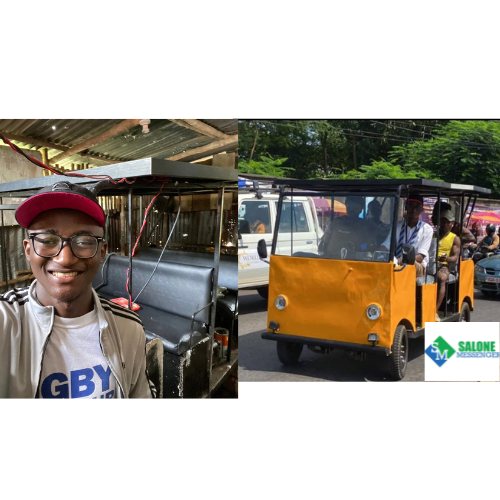
Reactions as young Sierra Leonean entrepreneur builds the first ever electric shuttle minibus with spaces for persons with disability in clean energy push, drives it in Freetown
Sierra Leoneans from across the world took to social media to celebrate a talented Sierra Leonean entrepreneur after a video of him went viral driving his first-ever electric shuttle minibus with spaces for persons with disability (that can accommodate them while in their wheelchairs) built from scratch.
Sierra Leonean entrepreneur James Samba has built the first-ever electric shuttle minibus with spaces for persons with disability (that can accommodate them while in their wheelchairs). During an interview with Salone Messenger, a public relation firm, James Samba stated “The Buss I have built operate without fuel or oil, can self-recharge itself, it also carry up to 10 passengers”
Salone Messenger reported that James Samba has worked on several projects including FM radio transmitter, auto-intensity street light, a non-fuel generator, remote control wheelchair, automated handwashing station, a sanitizer dispenser, solar backpack, and has solved many problems in the communities ranging from light security, electricity, climate change, coronavirus prevention, to name but a few.
James Samba has gone a step further to build the first ever electric shuttle minibus with spaces for persons with disability (that can accommodate them while in their wheelchairs from scratch in a push to promote clean energy, curb pollution, address and create a better option to the high prices of gasoline (relatively reflecting on high transportation costs/fares), the neglect of the physically challenged (in wheelchairs) in the public transportation sector
Africa’s top producer and exporter of crude oil have heavily-subsidized gasoline and a patchy supply of electricity — a combination that might discourage anyone from investing in electric vehicles.
But James Samba, a 20-year-old student, self-taught Engineer and chief Innovation Officer, and founder of Wanjama Innovative-s. and resident of Pujehun Town, in the southern provinces of Sierra Leone in Sierra Leone is undaunted. He says rising global oil prices and pollution make electric vehicles a worthwhile alternative in Sierra Leone.
At a friend’s workshop, he has already stripped combustion engines from 10 mini-buses, powering them with solar batteries. The buses, which have been operating for just over a month, cover a distance of 100 km on a single charge, he said.
Like many innovators, James accounted for numerous challenges trying to solve problems, speaking to Salone Messenger, he said
‘’The issue of funding has been the key challenge I’ve been facing lately. Getting materials to work with on a particular project is hard and many are to be purchased locally and sometimes ordered. 90% of all my innovative solutions are self-funded; I have to squeeze from my school allowance and sometimes even beg from friends and other relatives to assist me with some cash to buy the materials needed. ‘’Despite these challenges, James is hoping that his innovative ideas will make difference in the lives of people, he sees himself solving modern-day problems through his technology. This to James is his greatest achievement ‘’ My greatest achievement in the line of my work, innovation, has been, creating solutions to problems affecting people (or more precisely, me being a problem-solver). With extreme gratitude to the UNDP Accelerator Lab, I have been able to learn more on my pace of becoming a real-time problem-solver through their funded training program on Innovation and Entrepreneurship at Limkokwing University. He noted.
His most ambitious project is building the buses from scratch.
In Sierra Leone, like most of Africa, electric vehicles have not yet gained traction because they are more expensive and there is little electricity and no infrastructure to charge vehicles.
Due to the electricity challenge, James Samba noted that the buss operates without fuel or oil, can self-recharge itself, can carry up to 10 persengers, to name but a few.







